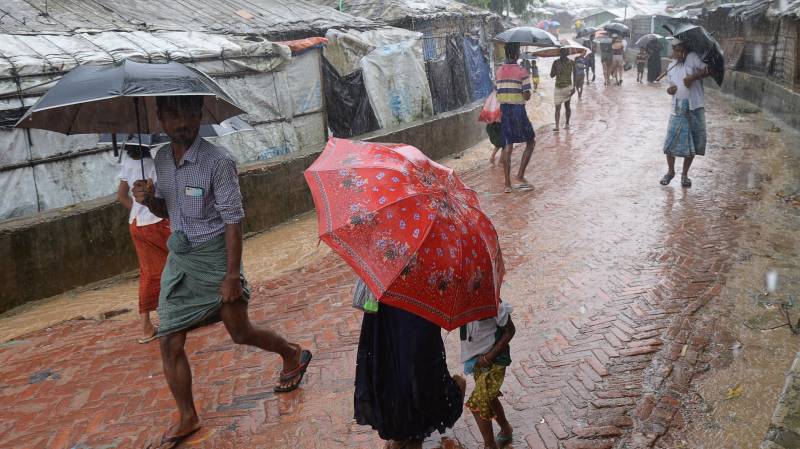Coronavirus keeps Rohingya indoors on 'genocide' anniversary

Stay tuned with 24 News HD Android App

Almost a million Rohingya refugees stuck in Bangladesh marked three years since escaping from Myanmar on Tuesday, with coronavirus forcing them to hold a day-long "silent protest" inside their flimsy, leaky huts.
An August 2017 military operation that has triggered genocide charges at the UN's top court drove 750,000 Rohingya out of Myanmar's Rakhine state into neighbouring Bangladesh, to join 200,000 who fled earlier.
Three years later, and with no work or decent education for their children, there is little prospect of a return to Myanmar, where members of the mostly Muslim minority have long been treated as inferior intruders.
Myanmar's military "killed more than 10,000 of our people. They carried out mass murders and rapes and drove our people from their home", Mohib Ullah, a Rohingya leader in the camps, told AFP.
For the second anniversary last year, Ullah led a rally of about 200,000 protesters at Kutupalong, the largest of the network of camps in southeast Bangladesh, where 600,000 people live in cramped and unsanitary conditions.
But the Bangladeshi authorities, increasingly impatient with the Rohingya and who a year ago cut internet access in the camps, have banned gatherings because of the coronavirus pandemic. There have been fewer than 100 reported infections and six deaths.
Silence and prayers
The sprawling camps have been cut off from the rest of Bangladesh, with the military erecting barbed-wire fences around the perimeters. Inside, movement has been restricted.
With people marking "Genocide Remembrance Day" with silence and prayers inside their rickety homes, the camps bore a deserted look, with shops and the usually teeming tea stalls closed as heavy rain pounded the camps.
Rohingya groups have distributed leaflets and flyers and pasted posters showing Myanmar's leader Aung San Suu Kyi and its military chief Min Aung Hlaing.
One poster read: "Aung San Suu Kyi is a terrorist, not a Nobel Peace prize winner". Another called for the International Court of Justice to hang Min Aung Hlaing. "I have been waiting for justice for the last three years," Hanufa Begum, 44, whose husband and two sons were killed in 2017, told AFP as she sat outside her shanty home.
Bangladesh has signed an agreement with Myanmar to return the refugees, but the Rohingya refuse to go back without guarantees for their safety and proper rights.
About 600,000 Rohingya remain in Myanmar, but most are not regarded as citizens, living in what Amnesty International describes as "apartheid" conditions.
Years of suffering
The Rohingya doubt the "sincerity of the Myanmar authorities", Bangladesh foreign secretary Masud bin Momen said.
Desperation had led hundreds to flee the camps for other countries this year on rickety boats often arranged by unscrupulous trafficking gangs.
"I cannot describe how much suffering we have gone through for the past three years," said Mohammad Bashar, 30, a madrasa student in Myanmar border town of Maungdaw who lost his father and uncles in 2017.
"Living here in the camps like beggars and unwanted, I often see my tree-shaded homestead, cows and my happy family in my dreams, but that world has been shattered and devastated," he told AFP.
"Myanmar needs to accept an international solution that provides for the safe, voluntary return of Rohingya refugees, while an understandably stretched Bangladesh should not make conditions inhospitable for refugees who have nowhere to go," said Brad Adams from Human Rights Watch.
